Opera
2012.12.02 12:59
메트오페라 '아이다(Aida)' Photo Gallery
조회 수 23922 댓글 0
베르디 걸작 '아이다(Aida)' 메트오페라 리바이벌
"암네리스 역을 맡은 올가 보로디나의 열정과 파비오 루이지의 지휘가
오케스트라에 불을 비쳐 짜릿하고 에너제틱한 공연으로 이끌었다."
-뉴욕타임스-
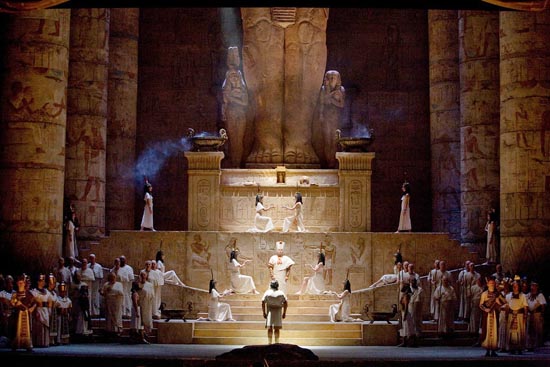
고대 이집트를 배경으로 한 '아이다'의 웅장한 세트가 베르디의 '개선 행진곡'과 함께 웅장한 오페라의 정수를 보여준다.
Photo: Marty Sohl/Metropolitan Opera (c) 2007
Four Acts by Giuseppe Verdi
Italian Libretto by Antonio Ghislanzoni
Approximate running time 3 hrs. 36 min.
The Met’s unforgettable production of Verdi’s ancient Egyptian drama stars Liudmyla Monastyrska and Hui He. They share the title role of the enslaved Ethiopian princess caught in a love triangle with the heroic Radamès, played by Carl Tanner and Roberto Alagna, and the proud Egyptian princess Amneris, sung by Dolora Zajick and Olga Borodina. Fabio Luisi conducts this revival, which features recent choreography by Alexei Ratmansky.
12/3(월) 오후 7시30분, 7일(금) 오후 8시/12일(수) 오후 7시30분,
15일(토) 오후 1시 'The Met: Live in HD' 소프라노 르네 플레밍 사회로 64개국 1900개 영화관에서 라이브 중계.
19일(수) 오후 7시30분, 22일(토) 오후 8시, 28일(금) 오후 7시 30분.
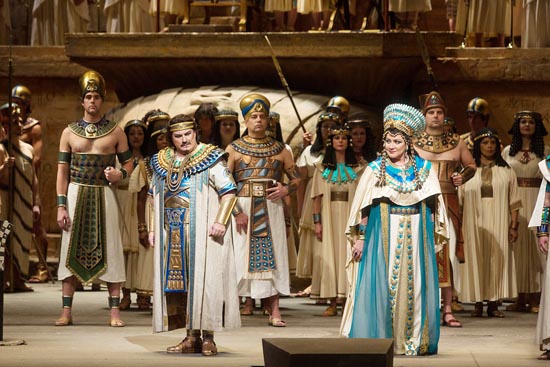
라다메스 대장 역의 칼 태너와 암네리스 공주 역의 올가 보로디나. Photo: Marty Sohl/Metropolitan Opera
CAST
Conductor: Fabio Luisi
Aida: Liudmyla Monastyrska/Hui He
Amneris: Olga Borodina
Radamès: Roberto Alagna /Carl Tanner
Amonasro: George Gagnidze /Alberto Mastromarino
Ramfis: Stefan Kocán
The King: Miklós Sebestyén
THE PRODUCTION TEAM
Production: Sonja Frisell
Set Designer: Gianni Quaranta
Costume Designer: Dada Saligeri
Lighting Designer: Gil Wechsler
Choreographer: Alexei Ratmansky
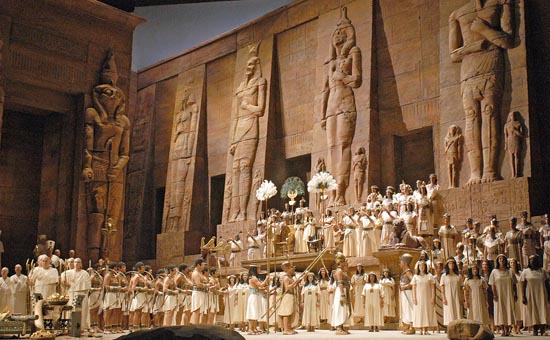
'아이다' 제 2막 중 한 장면. Photo: Marty Sohl/Metropolitan Opera (c) 2005
Act I
Egypt, during the reign of the pharaohs. At the royal palace in Memphis, the high priest Ramfis tells the warrior Radamès that Ethiopia is preparing another attack against Egypt. Radamès hopes to command his army. He is in love with Aida, the Ethiopian slave of Princess Amneris, the king’s daughter. Radamès dreams that victory in the war would enable him to free her and marry her (“Celeste Aida”). But Amneris loves Radamès, and when the three meet, she jealously senses his feelings for Aida. A messenger tells the king of Egypt and the assembled priests and soldiers that the Ethiopians are advancing. The king names Radamès to lead the army, and all join in a patriotic anthem. Left alone, Aida is torn between her love for Radamès and loyalty to her native country, where her father, Amonasro, is king (“Ritorna vincitor”). She prays to the gods for mercy.
In the temple of Vulcan, the priests consecrate Radamès. Ramfis orders him to protect the homeland.
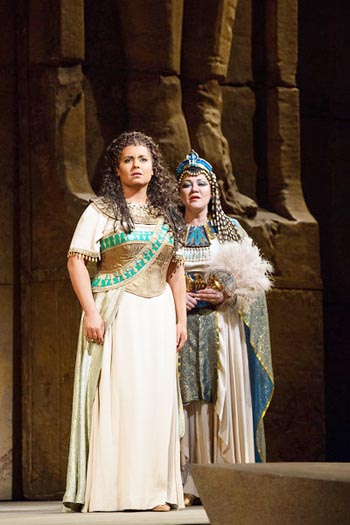
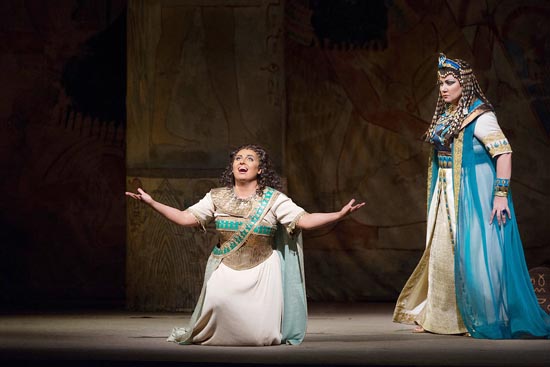
아이다 역의 루드밀라 모나스티르스카와 암네리스 역의 올가 보로디나. Photo: Marty Sohl/Metropolitan Opera
Taken during a rehearsal at the Metropolitan Opera on November 15, 2012
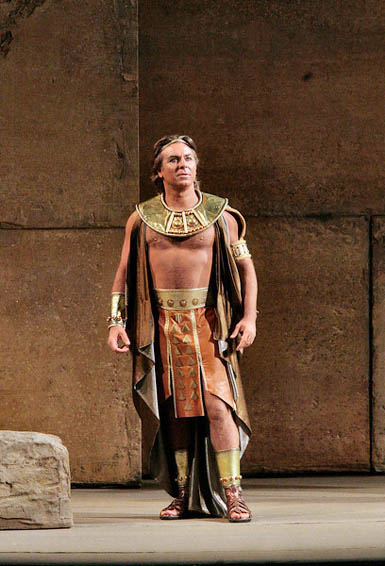
로베르토 알라냐는 라다메스 역을 맡았다. Photo: Ken Howard/Metropolitan Opera (c) 2007
Act II
Ethiopia has been defeated, and Amneris waits for the triumphant return of Radamès. When Aida approaches, the princess sends away her other attendants so that she can learn her slave’s private feelings (Duet: “Fu la sorte dell’armi”). She first pretends that Radamès has fallen in battle, then says he is still alive. Aida’s reactions leave no doubt that she loves Radamès. Amneris, determined to be victorious over her rival, leaves for the triumphal procession.
At the city gates the king and Amneris observe the celebrations and crown Radamès with a victor’s wreath (Triumphal scene: “Gloria all’Egitto”). Captured Ethiopians are led in. Among them is Amonasro, Aida’s father, who signals his daughter not to reveal his identity as king. Radamès is impressed by Amonasro’s eloquent plea for mercy and asks for the death sentence on the prisoners to be overruled and for them to be freed. The king grants his request but keeps Amonasro in custody. The king declares that as a victor’s reward, Radamès will have Amneris’s hand in marriage.
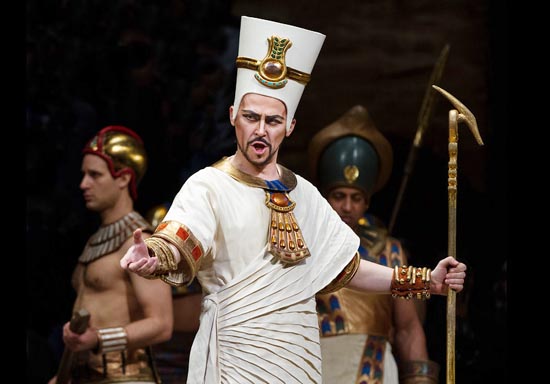
람피스 역의 스테판 코찬. Photo: Marty Sohl/Metropolitan Opera
Taken during a rehearsal at the Metropolitan Opera on November 15, 2012
Act III
On the eve of Amneris’s wedding, Ramfis and Amneris enter a temple on the banks of the Nile to pray. Aida, who is waiting to meet Radamès in secret, is lost in thoughts of her homeland (“O patria mia”). Suddenly Amonasro appears. Invoking Aida’s sense of duty, he makes her promise to find out from Radamès which route the Egyptian army will take to invade Ethiopia (Duet: “Rivedrai le foreste imbalsamate”). Amonasro hides as Radamès enters and assures Aida of his love (Duet: “Pur ti riveggo, mia dolce Aida”). They dream about their future life together, and Radamès agrees to run away with her. Aida asks him about his army’s route, and just as he reveals the secret, Amonasro emerges from his hiding place. When he realizes that Amonasro is the Ethiopian king, Radamès is desperate about what he has done. While Aida and Amonasro try to calm him, Ramfis and Amneris step out of the temple. Father and daughter are able to escape, but Radamès surrenders to the priests.
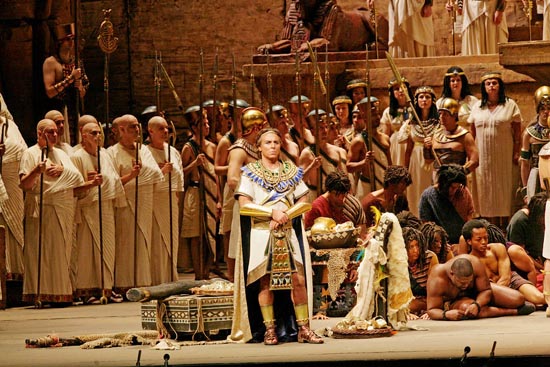
이집트 공주 출신 노례 아이다를 사랑하는 라다메스 대장 역의 로베르토 알라냐.
Photo: Ken Howard/Metropolitan Opera (c) 2007
Act IV
Radamès awaits trial as a traitor. He believes Aida to be dead but then learns from Amneris that she has survived. Amneris offers to save him if he renounces her rival but Radamès refuses. Brought before the priests, he remains silent to their accusations and is condemned to be buried alive. Amneris begs for mercy, but the judges will not change their verdict. She curses the priests.
Aida has hidden in the vault to share Radamès’s fate. They express their love for the last time (Duet: “O terra, addio’) while Amneris, in the temple above, prays for Radamès’s soul.




 뉴욕필 샌디 피해자 무료 티켓 배부(12/13-20)
뉴욕필 샌디 피해자 무료 티켓 배부(12/13-20)
 싸이(Psy) '유튜브의 제왕' 등극 & YouTube 최다 조회 비디오 Top10
싸이(Psy) '유튜브의 제왕' 등극 & YouTube 최다 조회 비디오 Top10

